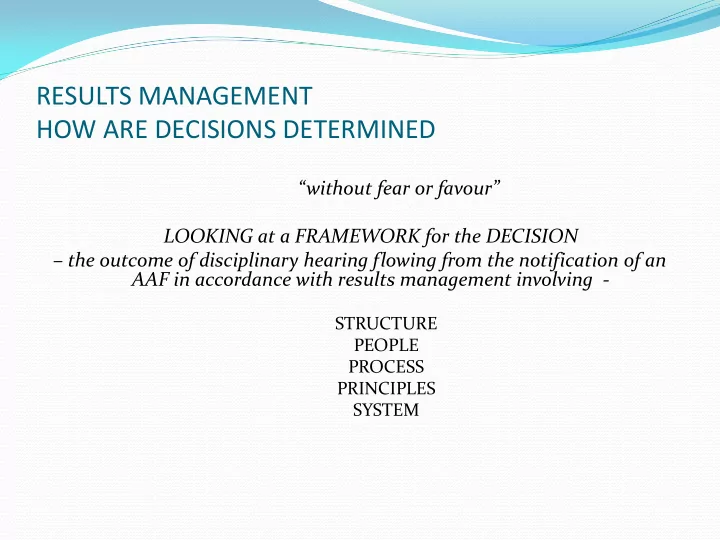

RESULTS MANAGEMENT HOW ARE DECISIONS DETERMINED “without fear or favour” LOOKING at a FRAMEWORK for the DECISION – the outcome of disciplinary hearing flowing from the notification of an AAF in accordance with results management involving - STRUCTURE PEOPLE PROCESS PRINCIPLES SYSTEM
RESULTS MANAGEMENT HOW ARE DECISIONS DETERMINED “ begin with the end in mind” COMMITTEE decision to be Clear Concise Consistent Courageous Challenging ?
RESULTS MANAGEMENT HOW ARE DECISIONS DETERMINED In an approach within the DC and decision making process which seeks to ensure Courtesy Cohesiveness Consensus seeking Complete understanding Constitutional Cover of the Bill of Rights Common Law protection of natural justice
RESULTS MANAGEMENT HOW ARE DECISIONS DETERMINED Article 8 Disciplinary Procedure 8.1 Appointment of the SAIDS Anti-Doping Disciplinary Committees “DCs” 8.2 Jurisdiction of the DCs – “THE POWER” to hear and determine all issues referred to it to determine the Consequences of ADRVs necessary for or incidental to exercise its functions
RESULTS MANAGEMENT HOW ARE DECISIONS DETERMINED Shall be fair and impartial Ouster of courts jurisdiction unless miscarriage of justice - 8.2.4 8.3 Hearings before DC 8.4 Proceedings of DC 8.5 Decisions of DC
RESULTS MANAGEMENT HOW ARE DECISIONS DETERMINED 8.1 Appointment of the SAIDS Anti-Doping Disciplinary Committees 8.1.1 SAIDS may appoint SAIDS Anti-Doping Disciplinary Committees to serve in the major geographical areas of South Africa. Every Anti- Doping Rule violation shall be heard by a SAIDS Anti-Doping Rule Committee or by a SAIDS accredited National Federation Anti- Doping Disciplinary Tribunal. Each SAIDS Anti- Doping Disciplinary Committee will comprise of the following:
RESULTS MANAGEMENT HOW ARE DECISIONS DETERMINED A Chair and two (2) Vice-Chairs, who should preferably a) be legal practitioners or anti-doping experts of not less than five (5) years standing; and Three (3) members who have not less than five years b) experience in the specialist fields of sports medicine, analytical and/or forensic pharmacology or endocrinology; and Three (3) additional members; each of whom shall be, or c) has previously been, a sports administrator or an Athlete, all of whom will be appointed on the basis that they are in a position to hear the cases fairly, impartially and independently.
RESULTS MANAGEMENT HOW ARE DECISIONS DETERMINED 8.3 Hearings Before a SAIDS Anti-Doping Disciplinary Committee 8.3.1 When it appears, following the results management process described in Article 7(Results Management), that these Anti- Doping Rules may have been violated, SAIDS shall refer the matter to a SAIDS Anti-Doping Disciplinary Committee for adjudication as to whether a violation of these Anti-Doping rules has occurred and if so what Consequences should be imposed.
RESULTS MANAGEMENT HOW ARE DECISIONS DETERMINED 8.3.2 The Chair of a SAIDS Anti-Doping Disciplinary Committee, or in his/her absence, a Vice- Chair, shall appoint not less than three (3) members from the panel to hear and determine each case. Each such hearing panel shall comprise the Chair or a Vice-Chair as chair of the hearing panel, one medical practitioner member and one sports administrator or Athlete member.
RESULTS MANAGEMENT HOW ARE DECISIONS DETERMINED 8.3.3 The appointed members shall have had no prior involvement with the case. Each member, upon appointment, shall disclose to the Chair any circumstances likely to affect impartiality with respect to any of the parties.
RESULTS MANAGEMENT HOW ARE DECISIONS DETERMINED 8.5 Decisions of a SAIDS Anti-Doping Disciplinary Committee 8.5.1 The deliberations of the hearing Committee on its decision shall be private. 8.5.2 Any minority or dissenting decisions shall be noted in the written reasons. In the event of a majority decision, this shall be the decision of the hearing Committee. 8.5.3 The decision of the hearing Committee shall be written, dated and signed.
RESULTS MANAGEMENT HOW ARE DECISIONS DETERMINED In order to expedite the finalization of the hearing, the decision may be handed down without written reasons in accordance with the time schedule outlined in Article 8.3.8. In any case in which the period of Ineligibility is eliminated under Article 10.5.1 (No Fault or Negligence) or reduced under Article 10.5.2 ( No Significant Fault or Negligence) the decision shall explain the basis for the elimination or reduction.
RESULTS MANAGEMENT HOW ARE DECISIONS DETERMINED 8.5.4 The decision of the hearing Committee shall be advised to the parties to the proceedings, WADA, the relevant International Federation (and to the National Olympic Committee and National Sports Federation if not a party to the proceedings) as soon as practicable after the conclusion of the hearing. 8.5.5 Decisions of the SAIDS Anti-Doping Hearing Committee may be appealed as provided in Article 13 (Appeals)
A time for reflection Sinethemba Mncane - dagga 3 months James Best steroids / mhex 2 years Molefi Matima steroids list 2 years Unathi Nteta steroids/mhex 18 months Gregory Nkoana dagga 2 months Russell Lund steroids 2 years Jan Truter steroids 2 years
“ getting rights right Some concerns insufficient and/or lack of credible evidence failure to call witnesses -corroboration failing to produce documents cost of representation role of chairman – facilitator / influence - “the good the bad and the ugly ” discretionary powers
some more concerns expense of calling expert witnesses “playing fields are still not level” presenting the case vs responding to the case keeping a record of the hearing proceedings applying discretion in giving meaning to “exceptional” / “aggravating” / “activity” language and appointment of interpreter(s) leading the witness in evidence
Recommend
More recommend